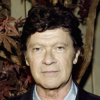Robbie Robertson

Robbie Robertson
Jaime Royal "Robbie" Robertson, OC, is a Canadian singer-songwriter and guitarist best known for his work as lead guitarist and primary songwriter for The Band. As a songwriter, he is credited for "The Weight", "The Night They Drove Old Dixie Down", "Up on Cripple Creek", "Broken Arrow", "Somewhere Down the Crazy River", and many others. He has been inducted into the Canadian Songwriters Hall of Fame and was ranked 59th in Rolling Stone magazine’s list of the 100 greatest guitarists...
NationalityCanadian
ProfessionRock Singer
Date of Birth5 July 1943
CityToronto, Canada
CountryCanada